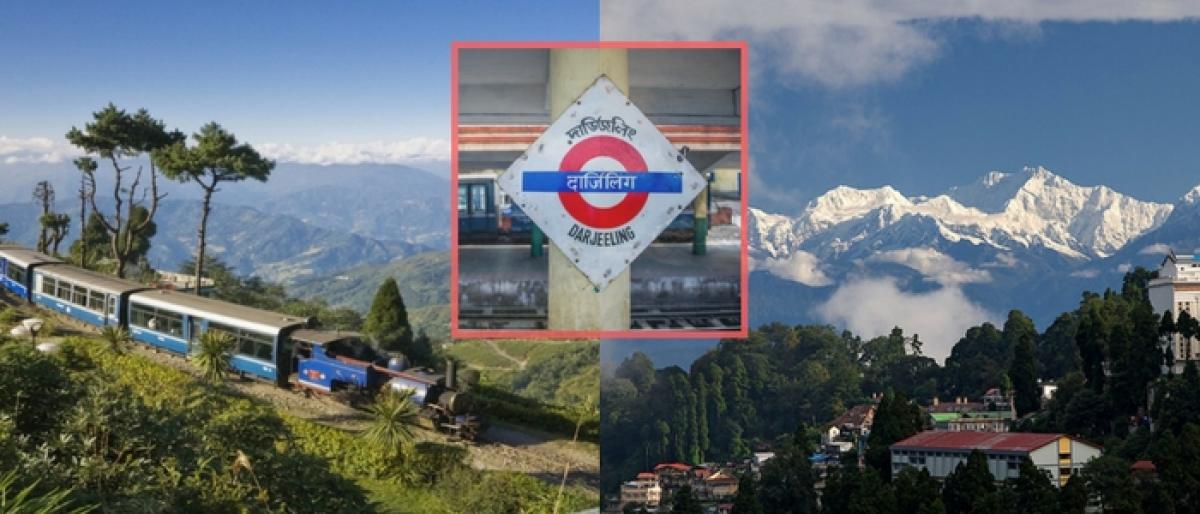Live
- Deep sea mission in early 2026
- Police arrest 3 persons over body parcel to family
- Medical camp held in Maoist area
- CM Cup 2024: Telangana Gears Up for State-Level Sports Fest
- Bandi stresses dedicated efforts for uplifting backward areas
- CPI Marks 100 Years of Revolutionary Struggles for Social Justice
- Demand to provide jobs to Srisailam project displaced
- Safeguarding Justice: Advocates Protest Court Relocation in Gadwal
- MLA Yennam distributes blankets to students
- Rice worth Rs. 420 cr misappropriated
Just In

When the wind is right and the cloud is gone, you can see down this road as far as Darjeeling,\' I told her. \'But it is a long and difficult road, full of perils, and if a traveller on foot were to look at the length of it, his spirit would be overcome and he would sit down and refuse to go any further.
‘When the wind is right and the cloud is gone, you can see down this road as far as Darjeeling,' I told her. 'But it is a long and difficult road, full of perils, and if a traveller on foot were to look at the length of it, his spirit would be overcome and he would sit down and refuse to go any further.
You must not look to the end of the road, Portia. Look only to the step in front of you. That you can do. Just one step. And you will not make the journey alone,'" Deanna Raybourn famously wrote in "Dark Road to Darjeeling".
These lines would be read aloud again and again by our headmaster during my childhood in a boarding school in Darjeeling.
He was a strict disciplinarian and an avid trekker who would lead a troupe of 50-60 interested students on long treks right up to the mountains and through the most remote hamlets of the hills -- the small pristine villages of Chitre, Chimney, Dowhill and Bagora, among others -- literally mingling with the fog that played hide and seek with travellers.
Growing up in the hills, surrounded by birds, bees and a hundred different kinds of trees in the midst of a perennial calm that then exemplified Darjeeling, I had come to terms with the serenity of the hills, the composed temperament of being one with nature and, above all, a sense of belonging to a home of lush green tea valleys.
There is much more to Darjeeling than just tourism. The lifestyle and culture in this part of north Bengal is different from most parts of the country, and more so from West Bengal, the state in which this small tourist destination is situated.
Another significant aspect of Darjeeling is its many heritage schools that house boarding students from across the country. The small towns of Kurseong, Mirik, Kalimpong and, of course, Darjeeling, are home to some of the most reputed ICSE schools in India.
As one looks at the horrifying images of violent mobs burning public properties and clashing with police personnel amid the growing unrest in the hills, thoughts return to those carefree days in Darjeeling, an everlasting testament to calmness and peace.
Violence and protests that have now come to define the Gorkhaland agitation are contrary to my memories of Darjeeling and its ever-warm and humble residents.
When I first arrived in Darjeeling as a young student -- away from the comfort of home -- its many warm people embraced me with open arms and thus began my tryst with the hills that has continued till today.
This was also the period when the Gorkhaland agitation, which was spearheaded in the 1980s by Subhash Ghisingh, a former army soldier and a poet, had faded away and paradise remained undisturbed.
In 2007, the demand for separate state was once again raised by Bimal Gurung, who broke off from Ghisingh's Gorkha National Liberation Front (GNLF) and floated a new party, the Gorkha Janmukti Morcha.
Repeated protests and agitations marked the next four years but as somebody witnessing it first-hand in the hills, it seemed more a result of the long-standing ethnic and linguistic factors than being politically motivated.
Whenever there were strikes or protests, the locals came out in large numbers to support the tourists and help them back safely.
Students like me were guided by our teachers and we took to the streets distributing food to stranded tourists, addressing their queries and even providing shelter to many in the school dormitories, when required.
It is these memories that make me refuse to believe that people in Darjeeling, as seen in recent reports, are violent and contemptuous towards tourists.
Darjeeling taught me to respect the "other", and to respect things that I may not associate myself with. As issues such as beef bans and religious tensions gain prominence today, I am reminded of the many meals that students shared happily at the same table.
My friends from Nepal loved pork, while those from Bangladesh preferred beef. I was happy with my chicken drumsticks and just around the corner would be vegetarians who were content with paneer.
Seven days a week -- all through the course of our schooling in -- we shared meals together, without one offending the other, or the other being offended by another.
One may argue that we were too young at that time to understand or voice opinions on these complex issues, but such habits of mutual respect are inculcated in the lives of almost everybody who grows up in Darjeeling. Imposing Bengali and making it compulsory was thus bound to displease the Nepali-speaking hill communities.
People in Darjeeling are, as they should be, proud of their heritage and culture. They are only as protective about it as their counterparts in the rest of Bengal but the violence that has come to surface does more harm to the ethereal image of Darjeeling than good.

© 2024 Hyderabad Media House Limited/The Hans India. All rights reserved. Powered by hocalwire.com







